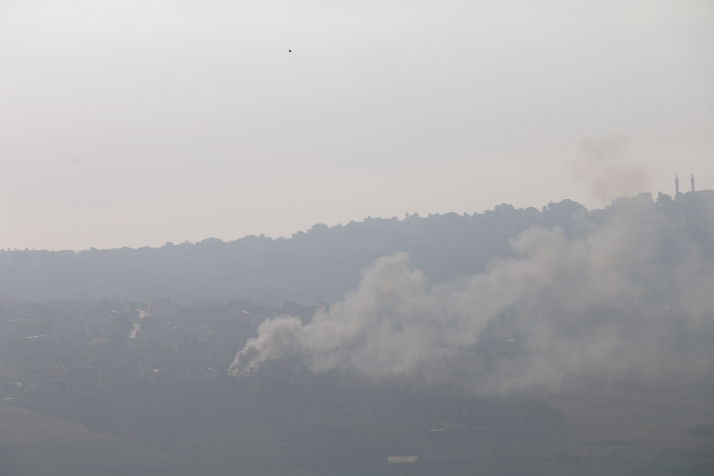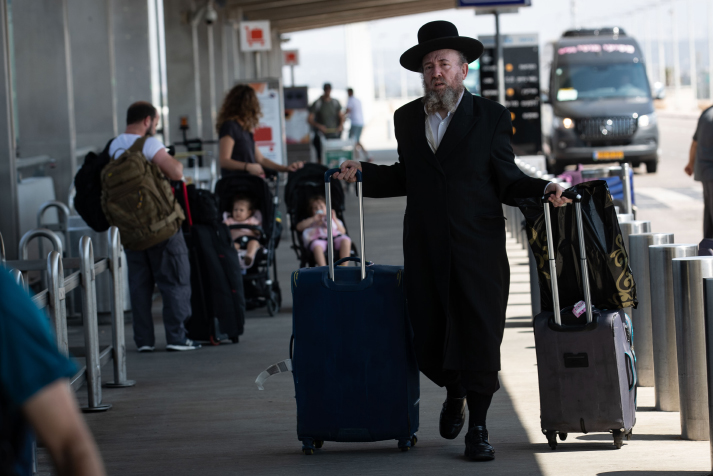| World |
| Likelihood of all-out war between Israel and Hezbollah remains low | |
|
|
 Smoke billows from the site of an Israeli airstrike in Marjeyoun, Lebanon, on August 25 (XINHUA)
Israeli forces and Lebanon's Hezbollah military group engaged in extensive exchanges of fire on the morning of August 25 along the Israel-Lebanon border, marking an escalation in their longstanding conflict. In a statement on the Telegram messaging app, Hezbollah said it had begun an attack as part of an "initial response" to the killing of Fouad Shukr, a senior commander of the group, in an Israeli airstrike on Beirut in late July. As the situation began to escalate, Israel reportedly carried out numerous preemptive airstrikes targeting Hezbollah's rocket launchers in south Lebanon, just half an hour before the militia's first missile barrage. Hezbollah fired missiles at Israel immediately after the outbreak of the Hamas-Israeli conflict on October 7, 2023. Hezbollah and Israel have been exchanging fire constantly ever since, while avoiding a major escalation. The recent surge in hostilities raises the risk of a broader conflict that could involve regional and international players, including the United States and Iran, and threatens to derail ongoing ceasefire efforts in the Palestinian enclave of Gaza. A quick battle In a second statement on the morning of August 25, Hezbollah stated it had completed the first phase of its attack, which included launching both attack drones and 320 rockets at 11 military installations in north Israel. The rockets were aimed at Israeli military sites in an attempt to facilitate the drones' passage toward targets deeper inside Israel, according to Hezbollah. The group later released an additional statement, saying Israel's claims about the preemptive actions it carried out, the targets it achieved and its thwarting of the attack were empty claims and contradicted the facts on the ground. The Israel Defense Forces on that same day said approximately 100 Israeli fighter jets were involved in the Israeli operation as the military identified Hezbollah "preparing to fire missiles and rockets toward Israeli territory." The Israeli military confirmed that about 210 rockets and 20 drones were launched from Lebanon. Some were intercepted, while others caused damage and injury. According to news agency Reuters, three deaths were confirmed in Lebanon and one in Israel. Despite the intense morning clashes, fighting had largely subsided by the afternoon. Hezbollah leader Hassan Nasrallah stressed in a video address that the missiles were aimed primarily at military targets. "The target should not be a civilian enemy or infrastructure," he said. Li Zixin, an assistant research fellow at the China Institute of International Studies, said both sides have made strong political declarations but have been cautious in the operational actions they have taken, showing that neither of them has an intention of further escalating the situation. Hezbollah's choice of targets and the military equipment it deployed were restrained, avoiding casualties, Li told Beijing Review. Although Hezbollah publicly declared that this was only "phase one" of its operations, it also claimed to have met its objectives, suggesting that a larger-scale attack is unlikely in the short term, according to him. On the other hand, Israel's strategy is complicated by internal political divisions, despite the reported preemptive strikes and its capacity to conduct more extensive operations. Defense Minister Yoav Gallant and the country's central-left parties have expressed reluctance to expand military action. However, this does not entirely eliminate the risk of a prolonged conflict along the Israel-Lebanon border, as the potential for escalation remains, Li added.  A traveler enters Ben Gurion International Airport in Tel Aviv, Israel, on August 25. The airport experienced delays and flight redirections that day due to major missile exchange between Israel and Hezbollah (XINHUA)
Will Iran remain silent? On July 30, just hours after the killing of Shukr, the top political leader of the Palestinian Hamas movement, Ismail Haniyeh, who was in Tehran for the inauguration of Iran's new president, was killed in an Israeli strike, according to Hamas. Both Hezbollah and Hamas are part of the "axis of resistance" consisting of Iran and its allies. Since early August, Iran and Hezbollah have repeatedly announced plans to retaliate against Israel. In response, Israel has warned that it may launch a preemptive strike if there is evidence that Iran is planning an attack. But neither Israel nor Iran, along with Iran's allies, are willing to engage in a large-scale conflict. "Time is on our side and the waiting period for the response to Israel's assassination may be prolonged," Ali Mohammad Naeini, a spokesperson for Iran's Islamic Revolutionary Guard Corps, said during a press conference on August 20. Israel, for now, must remain in a "state of imbalance," and Iran's response may not be a repetition of the previous operations, he said, adding that the response scenarios are not the same, and Iranian commanders have the experience and tactic of punishing "the enemy" effectively and are not prone to "hasty action." "As time progresses, the likelihood of Iran taking arbitrary actions diminishes," Li said. "Nevertheless, Iran is still expected to take calculated steps against Israel, though the timing will be carefully considered." Iran will leverage its position to negotiate with the West, especially the United States, using psychological and geopolitical advantages to maximize its interests, according to Li. Concurrently, Iran will continue to coordinate with its allies to exert pressure on Israel, he added. After the 1979 Islamic Revolution, Iran shifted from being pro-U.S. to anti-U.S., and became a target of sanctions by Western countries. The Iran nuclear agreement, formally known as the Joint Comprehensive Plan of Action (JCPOA), signed between Iran and P5+1 countries—the U.S., the UK, France, China, Russia and Germany—in 2015, briefly lifted these sanctions. However, in 2018, Donald Trump withdrew the U.S. from the deal and reimposed comprehensive sanctions on Iran's energy and financial sectors, severely restricting its oil exports, which are a vital part of Iran's economy. Far from ceasefire Amid rising tensions between Israel and Hezbollah, Egypt is hosting a new round of negotiations aimed at ending the Gaza conflict starting on August 24. Egypt, along with Qatar and the United States, is leading mediation efforts to reach a truce and a hostage-prisoner swap deal between Israel and Hamas, with the goal of achieving a permanent ceasefire in Gaza, but no substantive progress has been achieved so far. An Israeli delegation took part in these latest negotiations. A Hamas delegation arrived in Cairo on August 24 to "listen to" the results of the Gaza ceasefire negotiations. Hamas officials have stated that the group will not participate directly in the negotiations. Instead, Hamas will continue to be involved indirectly, communicating through mediators. According to newspaper Times of Israel, the U.S. has been increasing pressure on Israel to swiftly reach a ceasefire and hostage-prisoner exchange agreement with Hamas, to prevent a larger-scale war across the Middle East. Additionally, it was previously reported that Iran indicated it might delay any retaliatory military action against Israel if a ceasefire agreement in Gaza could be reached. The Palestinian-Israeli conflict can only be resolved through negotiation, as military pressure alone exacerbates the situation without offering a sustainable solution. This applies equally to both Israel and members of the "axis of resistance," Li concluded. (Print Edition Title: An Uncertain Future) Copyedited by G.P. Wilson Comments to liwenhan@cicgamericas.com |
|
||||||||||||||||||||||||||||||
|